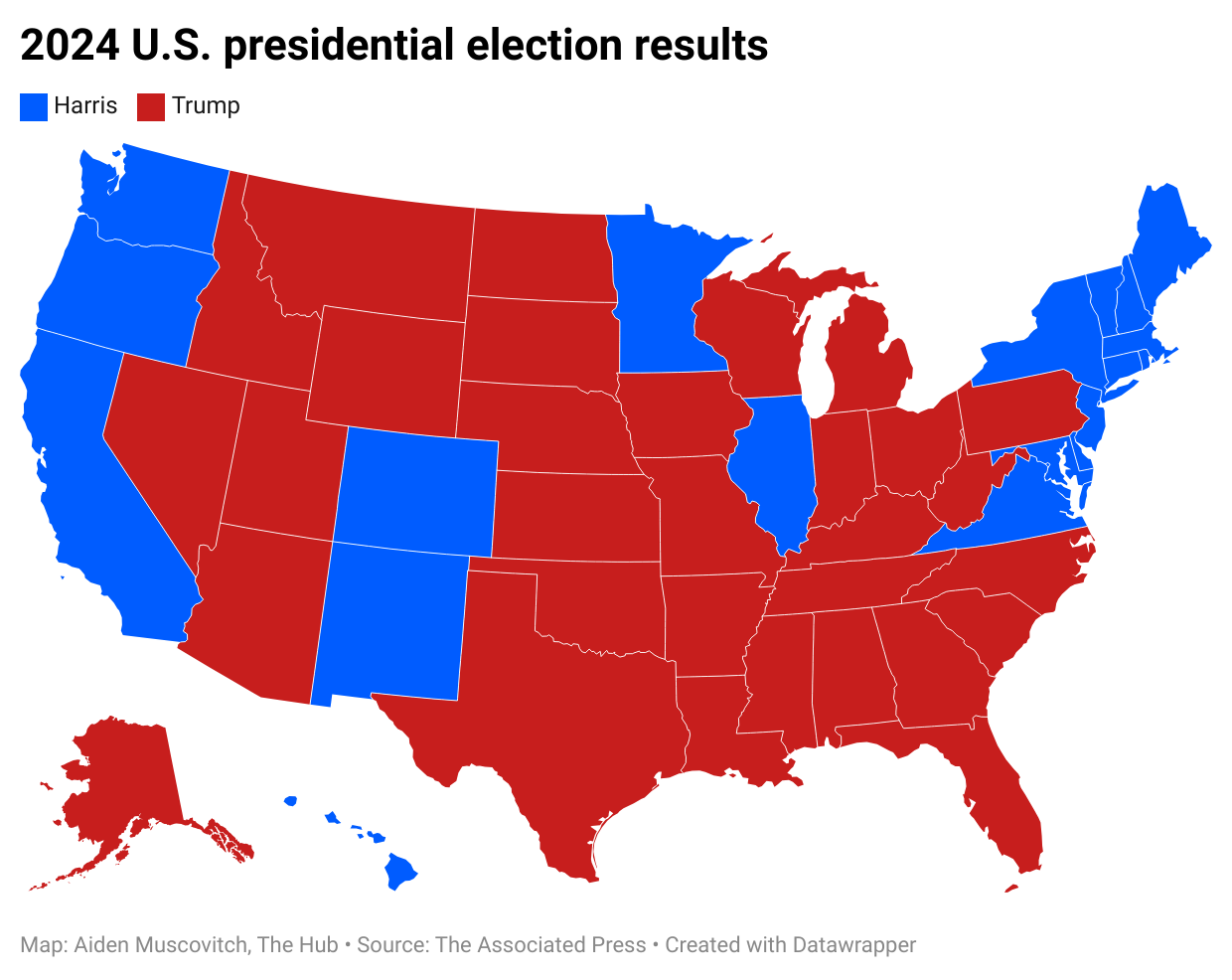This is The Week in Polling, your Saturday dose of interesting numbers from top pollsters in Canada and around the world, curated by The Hub. Here’s what we’re looking at this week.
Donald Trump wins the 2024 U.S. presidential election

Source: The Associated Press
Former president Donald Trump has secured victory in the 2024 U.S. presidential election by obtaining 312 votes in the electoral college, surpassing the necessary 270 to win.
Trump has won each of the seven swing states—Pennsylvania, Michigan, Wisconsin, North Carolina, Georgia, Arizona, and Nevada. A large part of his victory in the swing states and elsewhere was due to his popularity among men under 30 (49 percent), Latino men (55 percent), and voters without a college degree (56 percent).
Trump was also more popular amongst voters whose total family income was less than $50,000 in 2023 (50 percent).
Vice President Kamala Harris, the Democrat nominee, lost support largely from Latino voters (-12 percent), voters between the ages of 18 and 29 (-5 percent), and women (-3 percent) when compared to Joe Biden’s performance in his victory over Trump in the 2020 election.
Canadians prefer Pierre Poilievre to be prime minister in the case of a Donald Trump presidency
In a poll conducted late last month, nearly 40 percent of Canadians preferred having Conservative Party leader Pierre Poilievre as the country’s prime minister in the case of another Donald Trump presidency.
Since leaving office in 2020, Trump has called Prime Minister Justin Trudeau a “far-Left lunatic,” “two-faced,” and “weak.” Former New Democrat Party leader Tom Mulcair wrote in an article for CTV stating that Trudeau is on Trump’s “enemies list,” which could damage Canada’s social, economic, and environmental progress if he were to be prime minister during Trump’s next stint in office.
According to the Prime Minister’s Office, however, Trudeau and Trump shared a “warm” phone call the day after the election.
Poilievre congratulated Trump on X, saying that he will work with Trump to benefit both the U.S. and Canada, and reaffirmed his mission to save Canadian jobs from moving south of the border. Taking a patriotic tone, he concluded that we needed to “stand up for Canada.”
Before the election, the Liberals rolled out online ads that compared Poilievre to Trump. This could be a reaction to pre-election polls which indicate that Canadians are three times more likely to prefer Harris over Trump. Even Canadian Conservatives are split regarding their support of Trump. According to exclusive data provided to The Hub by André Turcotte of Pollara Strategic Insights, 44 percent of Conservative voters expressed a preference for Harris over Trump.
More than half of Canadians favour a bill making residential school denial and minimization a crime
In September, NDP MP Leah Gazan tabled a private member’s bill, Bill C-413, which would make “condoning, denying, downplaying or justifying the Indian residential school system in Canada or by misrepresenting facts relating to it” a criminal offence punishable by imprisonment for no more than two years. According to polling, more than half of Canadians want their MP to vote in favour of this idea.
Support for such a bill is highest among those who voted for the NDP (77 percent) and Liberal party (67 percent) last election. Forty-six percent of Conservative voters also preferred their MP to vote in favour of the bill.
Nearly 70 percent of First Nations Canadians want their MP to vote in favour, with only 24 percent wanting their MP to vote against it.
Canadians want Senate reform and abolishing it is on the table
Canadians are dissatisfied with the status quo Senate of Canada, with nearly half of Canadians (48 percent) wanting the Senate reformed to allow for citizen participation in the process of senator appointments.
When it comes down to what that change might look like, 38 percent of Canadians would like to elect their senators, instead of the prime minister naming them upon the recommendation of the current arms-length advisory body. Eighteen percent of Canadians would like to have a selection committee that appoints non-partisan senators. An equal amount of Canadians want to do away with the Senate entirely.
More than a quarter of Canadians (27 percent) believe that Canada does not need a Senate and prefers to have all legislation reviewed and authorized by the elected members of Parliament in the House of Commons.














